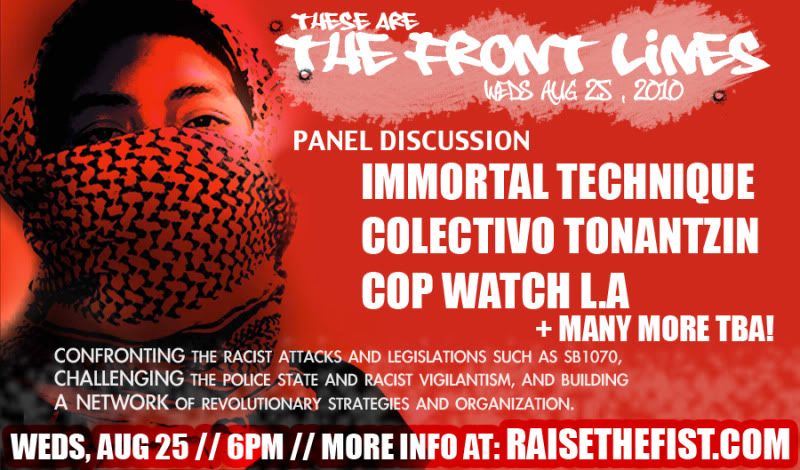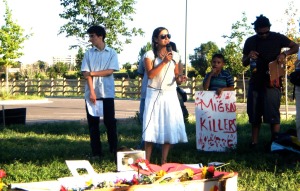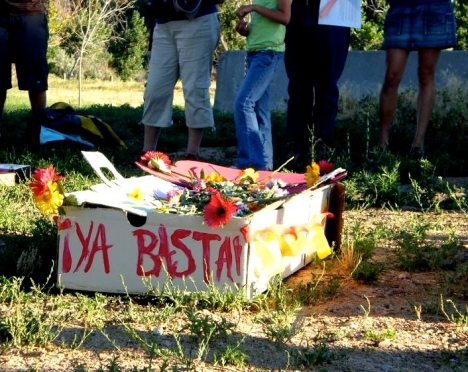Next to the figurines stand popsicles with Spanish markings.
Mexican candy lines an aisle next to pinatas.
The marinated meat is some of the best for making carne asada.
Jose Melendez, owner of Mexico Lindo market on North Fourth Street, has been offering Mexican goods to customers in Flagstaff for the last 10 years.
But now, with the passage of SB1070, Melendez is worried.
"Right now, business isn't really that good," Melendez said, adding that many of his Mexican customers have either moved or are thinking of moving out of state before the new law goes into effect July 29.
"A lot of them are hopeful the new law's not going to take effect," Melendez said, adding that many are waiting to see whether comprehensive reform at the federal level takes its place.
Armed with that hope, some families are staying until the end, he added.
EVERYBODY IS TALKING ABOUT IT
Across Arizona and the country, SB1070 has garnered support among a majority of residents. A recent Gallup poll determined that 51 percent of Americans who had knowledge of SB1070 supported it.
In the Hispanic community in the city, Melendez said everybody is talking about the new law going into effect. Most are worried about law enforcement officers stopping them in public for no reason at all.
Some people coming into the store have said they are afraid of driving because of the possible consequence if they are stopped, Melendez said. They have resorted to riding bicycles or walking.
"It's the main topic," Melendez added. "This law is even affecting legal residents. They don't want to go through that. I know that because a lot of them come to say 'Good bye.'"
RACIAL PROFILING WON'T HAPPEN
Sheriff Bill Pribil and Police Chief Brent Cooper both stated after training protocols on the new law came out last week that they would both be emphasizing training to ensure that racial profiling does not happen.
Both agencies have begun reviewing a draft policy issued by the Arizona Police Officer Standards and Training Board and are in the process of creating their own policies on enforcing the new law.
Chief Cooper also has recently attended a community meeting at St. Pius X Catholic Church to explain in detail what officers will and will not do in enforcing the new law, according to members of the Northern Arizona Interfaith Council. The council has a mission of building "... Relational power for collective actions in the pursuit of justice and the common good. We act to strengthen family and community in solidarity with others across lines of race, class and religion," according to the NAIC website.
MOTEL HOUSEKEEPERS FIRED
Maria (not her real name to protect her identity) is a customer of Melendez. She said she and her family are facing employers who are using SB1070 as a "hammer."
She said she and her husband are afraid and are making plans to leave the state because her husband has been told he must bring legal papers into work before July 29 or he will be fired. She said she and her daughter have already been fired their jobs cleaning rooms at a local motel.
Maria also said she has tried to get U.S. birth certificates for her grandchildren who were born here, but she's afraid to turn over any identification, because it is not from the U.S. The same goes for getting Social Security numbers, she said.
Her four children, now adults, were brought here when they were young and speak better English than Spanish, Maria said. Her five grandchildren know no other life.
BUSINESS OFF 40 PERCENT
As for the people who have already left Flagstaff, Melendez said they told him they believed they were not wanted in this state. Those people have moved to states where they believe they are wanted, or they have moved back to their country of origin.
Melendez looked around his store. Nobody was shopping mid-afternoon last week.
"As it is, I think I've lost 30 to 40 percent of my customers," Melendez said, adding that he is able to gauge the loss by the drop-off in money transfers and phone cards to Mexico.
A window sign calling for workers to strike and shoppers not to buy goods for two weeks if the law is not rescinded hung in a window at Melendez's market.
"I don't know if that can be done," Melendez said.
Most families in Flagstaff wouldn't be able to afford a two-week strike, Melendez said. Down south in Maricopa and Pima counties, such an effort might have more legs.
"But it would be an idea to show how much buying power and taxes are generated by the buying community," Melendez added.
If people are going to lose their jobs and get deported anyway, "they might as well do something about it," he said.
WILL STICK IT OUT
Melendez said he will try to stick it out to the very end, even though he is sure he will lose even more customers. Most of his goods are Mexican, and few Anglos come into the store to shop.
"If I can't pay my bills, I'll have to close my store down," he said, adding that if he has to close, he won't be able to pay his mortgage and might have to receive public assistance.
"I've always helped the economy, but if I lose my business, I won't be helping the economy anymore," he said. And job-hunting will be difficult for him at age 55.
As for the furor over the issue and people staunchly opposed to offering any kind of citizenship to illegal immigrants already here, Melendez said, "They are on the other side of the fence and have never been on this side of the fence."
Melendez was 10 years old when he came to the United States with his parents in 1960. His father had been born in Bisbee. When younger, Melendez did a stint in the U.S. Navy.
"All my brothers were in the service," Melendez said. "So we have all served this country. But we have always been proud of our Mexican heritage."
FEET IN TWO WORLDS
Melendez said he and his brothers are people with their feet in two worlds -- Mexico and the United States. Some people do not understand his and his family's struggles.
"If they knew how hard it is, they might ask the government to help more," Melendez said.
As for the imminent enforcement of the law, Melendez said he's frustrated.
"I'm trying everything I can to defeat this law," Melendez said, adding that 99 percent of the people who come to the United States illegally come to work hard for a better life when they return home.
Larry Hendricks can be reached at 556-2262 or lhendricks@azdailysun.com.
http://www.azdailysun.com/news/local/article_4519c97f-1de6-5fb9-b3b9-0df247c428a2.html 

















